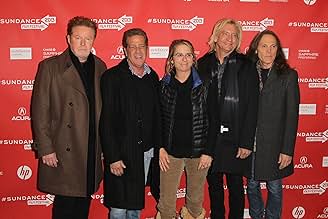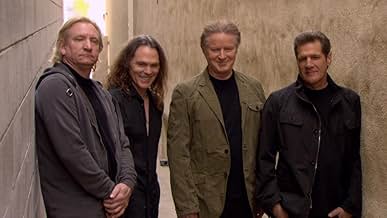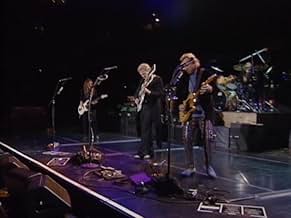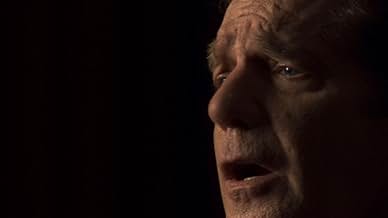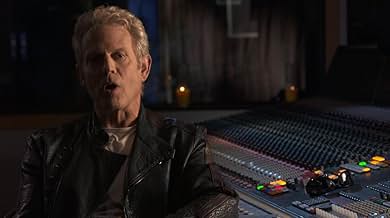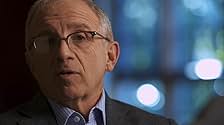IMDb RATING
8.2/10
2.9K
YOUR RATING
The life and times of the super successful American soft-rock band, Eagles.The life and times of the super successful American soft-rock band, Eagles.The life and times of the super successful American soft-rock band, Eagles.
- Won 1 Primetime Emmy
- 3 wins & 1 nomination total
Browse episodes
Featured reviews
I loved The Eagles back in the 70's, especially after I finished my military service. Now, watching this special, "The History of the Eagles," and downloading lyrics, I can see that, even without the music, the words are pure poetry. Having taught poetry for nearly 5 decades, that is my ultimate test of whether the lyrics are real, authentic, if you can divest them of the music and they're still poetry. Only the best artists can maintain that precious risk; take away the musical safety net, which might even support a simple three chord progression, and if what you have is still addressing key tenets of the Human Condition, then you aren't merely experiencing entertainers, money makers, or businessmen, you and dovetailing delightfully with poets.
Joe Walsh utters one of the most honest speeches I've ever heard a public figure deliver, and he struggles manfully, painfully, as if ripping heartfelt wisdom from deep within his being, about how in the final analysis, our lives are like fine-spun, intricately-woven novels; however, along the way, what we sense and experience is like running into a sudden comet or meteor, delectable or horrifying.
Don Henley, who always seems to know just what to say in the moment or afterwards, described his immediate ambiguous feelings directly following the cessation in 1980 of the band's efforts: "Horrible relief." I have to wonder how much of a gifted artist's time, effort, soul, life and genius they must invest. Henley comments that he often wondered why he was successful when equally-talented artists did not reach the apex of Henley's success. Glen Frey sends out a desperate, impassioned plea to his wife and children to support him and hope that their "second act" did not change him too drastically.
I admired the coloratura guitar riffs of Don Felder, and I was deeply saddened, when I learned that he had been replaced in one furious collision of egos and cat fights, some borderline, behind the scenes; others, embarrassedly right on stage in front of cheering but partly bewildered audiences. Frey conjures up the perfect analogy between a good band and a baseball team. You are all aligned in teamwork, energy, synergy; however, you don't have the ball in your own hand all of the time. Felder craved more opportunities to sing. Frey himself admitted that the longer The Eagles were together, the less and less he sang lead. Why? Because they had Don Henley. Henley himself mused that Felder's insistence he sing lead on one song was tantamount to Henley's demanding to play lead guitar on "Hotel California." I've watched this special now three times. It is so completely honest that no one individual emerges unscathed, yet most of them proceeded, like "Hotel California" not only from innocence to experience; but, moreover from some degree of benightedness toward a larger sense of awareness, maturity, good judgment and enlightenment as human beings, as artists, entertainers, writers, and people who realized how their creations behind the scenes and before jubilant audiences, mattered far more than they ever dreamed or feared or ever imagined could be realized.
The deep lessons I derived focused upon Henley's efforts to save Henry David Thoreau's "Walden" from commercial vandalism and decimation; Joe Walsh's gratitude at being driven to rehab so that he, too, could experience "A Second Act" with his band mates.
I think that "The History of the Eagles" should be required viewing of any budding producers, agents, or artists. It is one slice of life, one sobering view of fame, celebrity, success and failure, of Phoenixes emerging from their own self-induced immolation, of a group of young men growing up as their country and citizens in it also evolved painfully, sometimes jubilantly, with a lot of luck and some daunting disappointments.
Watching the movie is almost like watching and listening to a magician explain patiently how the trick worked as well as disclosing those times when it didn't work.
Joe Walsh utters one of the most honest speeches I've ever heard a public figure deliver, and he struggles manfully, painfully, as if ripping heartfelt wisdom from deep within his being, about how in the final analysis, our lives are like fine-spun, intricately-woven novels; however, along the way, what we sense and experience is like running into a sudden comet or meteor, delectable or horrifying.
Don Henley, who always seems to know just what to say in the moment or afterwards, described his immediate ambiguous feelings directly following the cessation in 1980 of the band's efforts: "Horrible relief." I have to wonder how much of a gifted artist's time, effort, soul, life and genius they must invest. Henley comments that he often wondered why he was successful when equally-talented artists did not reach the apex of Henley's success. Glen Frey sends out a desperate, impassioned plea to his wife and children to support him and hope that their "second act" did not change him too drastically.
I admired the coloratura guitar riffs of Don Felder, and I was deeply saddened, when I learned that he had been replaced in one furious collision of egos and cat fights, some borderline, behind the scenes; others, embarrassedly right on stage in front of cheering but partly bewildered audiences. Frey conjures up the perfect analogy between a good band and a baseball team. You are all aligned in teamwork, energy, synergy; however, you don't have the ball in your own hand all of the time. Felder craved more opportunities to sing. Frey himself admitted that the longer The Eagles were together, the less and less he sang lead. Why? Because they had Don Henley. Henley himself mused that Felder's insistence he sing lead on one song was tantamount to Henley's demanding to play lead guitar on "Hotel California." I've watched this special now three times. It is so completely honest that no one individual emerges unscathed, yet most of them proceeded, like "Hotel California" not only from innocence to experience; but, moreover from some degree of benightedness toward a larger sense of awareness, maturity, good judgment and enlightenment as human beings, as artists, entertainers, writers, and people who realized how their creations behind the scenes and before jubilant audiences, mattered far more than they ever dreamed or feared or ever imagined could be realized.
The deep lessons I derived focused upon Henley's efforts to save Henry David Thoreau's "Walden" from commercial vandalism and decimation; Joe Walsh's gratitude at being driven to rehab so that he, too, could experience "A Second Act" with his band mates.
I think that "The History of the Eagles" should be required viewing of any budding producers, agents, or artists. It is one slice of life, one sobering view of fame, celebrity, success and failure, of Phoenixes emerging from their own self-induced immolation, of a group of young men growing up as their country and citizens in it also evolved painfully, sometimes jubilantly, with a lot of luck and some daunting disappointments.
Watching the movie is almost like watching and listening to a magician explain patiently how the trick worked as well as disclosing those times when it didn't work.
10grantss
Great documentary on a great band.
Made in 2013, a documentary on the Eagles, from the early days of Glenn Frey and Don Henley to the (then) present day.
Includes interviews with the band members at different times in their lives, including in the mid-1970s. No narration, the movie is effectively narrated by the interviews.
Not your simple chronological telling of their story either, there is an examination of the impact of their music. Quite emotional at times.
Also quite bluntly told too. The frictions within the band are often examined and the truth is not sugar-coated.
A wonderful musical and emotional journey.
Made in 2013, a documentary on the Eagles, from the early days of Glenn Frey and Don Henley to the (then) present day.
Includes interviews with the band members at different times in their lives, including in the mid-1970s. No narration, the movie is effectively narrated by the interviews.
Not your simple chronological telling of their story either, there is an examination of the impact of their music. Quite emotional at times.
Also quite bluntly told too. The frictions within the band are often examined and the truth is not sugar-coated.
A wonderful musical and emotional journey.
After watching this again I still feel this was a monetary project from start to finish. It is nice to sit back and enjoy some of the music that you remember so well from the 70's decade. It is a pity that today's kids have nothing in the form of music or an identity that I had as a teenager in the seventies period. They have their phones and social internet and nothing else. There is not a single musician today that can even come close to entering the hero spaces musicians had in my teen years such as Dylan, Lennon, Roger Waters, down home southern poets like R.VanZant, and yes, Henley and Frey. For this reason I can relax some of my initial reaction to their egomania which is still painfully obvious. Don Henley's reaction to his very successful solo career which led to some masterful music in my opinion he just blows off with "I won some awards and had some hits" and finishes with his usual bombardment of everyone else and their unwillingness or inability to reach his own genius level-mainly producers, agents, songwriters and other musicians. He comes across as a total a$$ and seems to know it and not care the least-so be it.
The total highlights of the entire program belong to Joe Walsh for his honesty and in an indirect way to Linda Ronstadt and her blossoming sexually and "voice as big as a house" that I remember so, so well from that period. Again, there is nothing or no one today in terms of young female singers, that could match her talent or her effect on young men that I also remember so well- Henley's admission that she was "one of the boys" also reflects as an identical feeling I had about her at that time.
The star of the show is Joe Walsh as he seems so separated from the narcissistic love Henley and Frye have for themselves. His honest approach comes off as realist and sincere especially his reflections on how he remembers that era, as if it were a fiction novel, and using it for an example-brilliant! Perhaps some young people will take to heart what he has to say and use it to improve their own lives.
All the partying and some senseless nudity come across as flush material and the catfights between the former and current members of the group are nothing new to even casual fans of the band. I saw the Eagles live once during the Hotel California tour and their abilities as a live band, along with inspiring melodies and well rehearsed harmonies, were the impression I remember even today. Lynda Ronstadt was also touring with Jackson Browne about the same time and, of course, her show was unforgettable to say the least.
All in all this is a good production and I think people can use the ole saw "take what you want and leave the rest" and find this an enjoyable program to watch.
pa
How can you write a spoiler for a music program about 40year old songs?
The total highlights of the entire program belong to Joe Walsh for his honesty and in an indirect way to Linda Ronstadt and her blossoming sexually and "voice as big as a house" that I remember so, so well from that period. Again, there is nothing or no one today in terms of young female singers, that could match her talent or her effect on young men that I also remember so well- Henley's admission that she was "one of the boys" also reflects as an identical feeling I had about her at that time.
The star of the show is Joe Walsh as he seems so separated from the narcissistic love Henley and Frye have for themselves. His honest approach comes off as realist and sincere especially his reflections on how he remembers that era, as if it were a fiction novel, and using it for an example-brilliant! Perhaps some young people will take to heart what he has to say and use it to improve their own lives.
All the partying and some senseless nudity come across as flush material and the catfights between the former and current members of the group are nothing new to even casual fans of the band. I saw the Eagles live once during the Hotel California tour and their abilities as a live band, along with inspiring melodies and well rehearsed harmonies, were the impression I remember even today. Lynda Ronstadt was also touring with Jackson Browne about the same time and, of course, her show was unforgettable to say the least.
All in all this is a good production and I think people can use the ole saw "take what you want and leave the rest" and find this an enjoyable program to watch.
pa
How can you write a spoiler for a music program about 40year old songs?
I saw the Eagles in concert back in the summer of 77 (Linda Ronstadt opened!) at KC's Arrowhead Stadium, when the Eagles were at their peak, shortly after "Hotel California" had been released. Fast forward about 4 years, early fall 1981, I was hung-over in the afternoon after having celebrated my bachelor party the previous evening. I would be getting married in about 5 hours and was scared shitless. So I popped a beer, lit up a joint, threw a steak on the grill and listened to the HC album as it was the perfect background music for my brain as I tried to get a perspective on where I had been and where I was going. (BTW, still married to my love) The Eagles and their music were the perfect soundtrack for my life during the 70's when my priorities were girls, booze, recreational drugs, girls, bars, music, cars and girls.
So I was and remain a huge fan, although not interested in paying $200 plus for decent tickets to see them in concert (I might have paid $10 in 1977) and I've viewed the SHO doc about 4 times, recently for the first time since Frey's passing. I assume virtually everyone reading this page has also viewed it, so all can do is offer a few thoughts on a solid documentary about a what was a truly great band.
As is with most of these type of documentary's, the most interesting part are the early years, when the Eagles formed a group after being sidemen for various bands in the LA music scene of the late 60's and early 70's. Henley made an excellent observation about making it big but realizing that there were other musicians and writers, just as talented, but for one reason or another didn't get the big career break. Sometimes it's just being in the right place at the right time and for the Eagles, the wave broke just perfectly. After hitting the band hit superstardom with HC, Henley and Frey would align to take creative control of the group, which would ultimately cause the departure of two of the other originals, guitarist Bernie Leadon and bassist Randy Meisner. Lead guitarist Don Felder joined the band on album #3 "On the Border" (my personal favorite) and kicked the band up a notch with his blistering work, plus wrote the music for tune "Hotel California" (Henley & Frey try to minimize his contribution.) And it seems after HC everything pretty much went into the shitter as far as their relationships with one another as greed, arrogance and drugs devoured the band.
Some nice reflections by Joe Walsh, who was already a big name in rock when he joined the group for HC, replacing Leadon. Walsh almost killed himself through years of drug and alcohol abuse. He was able to clean himself up when the group reunited in 94 after 13 years and was able to tolerate the arrogance of Henley and Frey. Felder wasn't willing and ultimately would be fired by Henley, Frey and their manager Irving Azoff, the consigliere of the band. In retrospect Felder may have made the mistake that many make, overvaluing their contribution and importance to their organization. He did file a lawsuit for breach of contract that was settled by both parties and wrote a book about his experience that ultimately left him persona non grata to Henley and Frey and not in consideration for any further work with the band.
To this day the Eagles are still touring, with only Henley left from the original lineup. More power to them,but maybe we would be best left with just our memories of perhaps the most outstanding band of the greatest era in rock.
So I was and remain a huge fan, although not interested in paying $200 plus for decent tickets to see them in concert (I might have paid $10 in 1977) and I've viewed the SHO doc about 4 times, recently for the first time since Frey's passing. I assume virtually everyone reading this page has also viewed it, so all can do is offer a few thoughts on a solid documentary about a what was a truly great band.
As is with most of these type of documentary's, the most interesting part are the early years, when the Eagles formed a group after being sidemen for various bands in the LA music scene of the late 60's and early 70's. Henley made an excellent observation about making it big but realizing that there were other musicians and writers, just as talented, but for one reason or another didn't get the big career break. Sometimes it's just being in the right place at the right time and for the Eagles, the wave broke just perfectly. After hitting the band hit superstardom with HC, Henley and Frey would align to take creative control of the group, which would ultimately cause the departure of two of the other originals, guitarist Bernie Leadon and bassist Randy Meisner. Lead guitarist Don Felder joined the band on album #3 "On the Border" (my personal favorite) and kicked the band up a notch with his blistering work, plus wrote the music for tune "Hotel California" (Henley & Frey try to minimize his contribution.) And it seems after HC everything pretty much went into the shitter as far as their relationships with one another as greed, arrogance and drugs devoured the band.
Some nice reflections by Joe Walsh, who was already a big name in rock when he joined the group for HC, replacing Leadon. Walsh almost killed himself through years of drug and alcohol abuse. He was able to clean himself up when the group reunited in 94 after 13 years and was able to tolerate the arrogance of Henley and Frey. Felder wasn't willing and ultimately would be fired by Henley, Frey and their manager Irving Azoff, the consigliere of the band. In retrospect Felder may have made the mistake that many make, overvaluing their contribution and importance to their organization. He did file a lawsuit for breach of contract that was settled by both parties and wrote a book about his experience that ultimately left him persona non grata to Henley and Frey and not in consideration for any further work with the band.
To this day the Eagles are still touring, with only Henley left from the original lineup. More power to them,but maybe we would be best left with just our memories of perhaps the most outstanding band of the greatest era in rock.
Aside from a few moments that made we want to cringe (such as Glenn Frey's comments about Don Felder being fired during their reunion of the 1990s), this is a very enjoyable and thorough documentary about the Eagles. Not surprisingly, it focuses mostly on Frey and Don Henley-- the pair that wrote most of the songs, sang most of the songs and created the group. It follows the pair from their early pre-band days and ends around 2000. Through the course of the film, there are tons of interviews, lots of odd tidbits and a very comprehensive history of the group. For practically everyone except someone hating The Eagles (who would that be?!), a very well made and as complete a picture of the group as you can find.
Did you know
- TriviaThe documentary includes interviews from all seven members of the band through the decades
- GoofsGlenn Frey claims that "Take It To The Limit" was the Eagle's first number one record. In fact their first number one record was "Best of My Love" released over a year before.
- ConnectionsFeatured in 2013 Primetime Creative Arts Emmy Awards (2013)
- How many seasons does History of the Eagles have?Powered by Alexa
Details
- Release date
- Country of origin
- Language
- Also known as
- La historia de los Eagles
- Production company
- See more company credits at IMDbPro
- Runtime1 hour 34 minutes
- Color
Contribute to this page
Suggest an edit or add missing content



